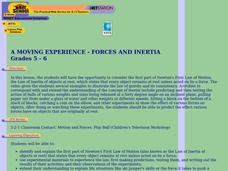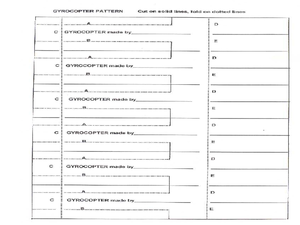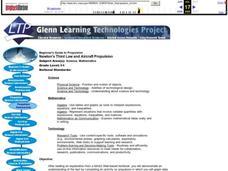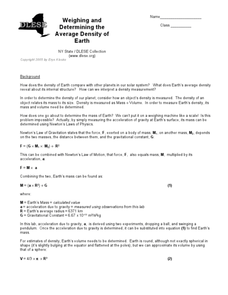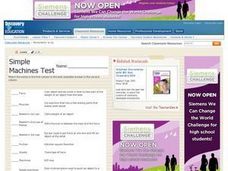Cornell University
Alka-Seltzer Rockets
Blast off! An engaging hands-on activity has pupils create rockets powered by Alka-Seltzer. They learn about the physics behind these rockets throughout the process.
Curated OER
Newton's Earthquake
Students discuss Newton's 2nd and 3rd laws using the example of a football linebacker and a small child pushing against each other on an ice rink. Students are able to visualize the results of the push and link it to the laws. Discussion...
Curated OER
A Moving Experience - Forces and Inertia
Students view a video and complete corresponding activities to observe inertia. They observe and predict the effect various forces have on objects.
Curated OER
Alka-Seltzer Rockets: How to Build Your Own Rocket
Students create a rocket using Alka-seltzer of baking soda and vinegar. In this physics lesson, students identify the factors affecting the length of time the rocket is propelled. They relate this activity to actual rocket launched in...
Curated OER
Momentum and Conservation of Momentum
In this momentum worksheet, students review the equation to solve for momentum and the Law of Conservation of Momentum. Students complete 8 matching, 6 fill in the blank, and 8 problems to solve.
Curated OER
Gyrocopters-Producing Rotary Motion
Students demonstrate rotary motion by practicing with gyrocopters. In this physics lesson students work in groups to construct a gyrocopter and explore how physics effect it torque and inertia.
Curated OER
E3 Ret Lesson Plan
Students explore friction. In this physics lesson plan, students will cover metal blocks with film to determine the changes caused by static and kinetic friction.
Curated OER
A Classical & Relativistic Trip to a Black Hole
Students calculate distance, velocity, acceleration and time on their fantasy trip to the black hold. They apply Newton's Laws of Motion and calculate circular motion. They discuss any questions that may arise.
Curated OER
Newton's Third Law and Aircraft Propulsion
Learners research propulsion, graph data, and interpret the results.
Curated OER
A Moving Experience - Forces and Inertia
Students consider the first part of Newton's First Law of Motion, the Law of Inertia of objects at rest, which states that every object remains at rest unless acted on by a force. They perform hands-on experiments which demonstrate this...
Teach Engineering
The Great Gravity Escape
Groups simulate an orbit using a piece of string and a water balloon. Individuals spin in a circular path and calculate the balloon's velocity when the clothes pin can no longer hold onto the balloon.
Curated OER
Weighing and Determining the Average Density of the Earth
Some background information about density and Newton's Laws of gravitation and motion assist pupils in the following experiment. The procedure will help them further their understanding of gravity, pendulums, and a drop-ball experiment....
Cornell University
Physics of Flight
Up, up, and away! Take your classes on a physics adventure. Learners explore the concepts important for flight. They experiment with the Bernoulli Principle while learning the forces that act on airplanes in flight.
NASA
Water Rocket Launcher
How can you launch an object that isn't propelled by air? The resource provides directions to build a launcher to launch rockets made of two-liter bottles. The launcher, built mainly from materials found at the local hardware store, uses...
Teach Engineering
Pushing it Off a Cliff
Focus on the conservation of energy, specifically looking at gravitational potential energy and kinetic energy, with a lecture that involves having friends throw light objects at each other to determine which has more kinetic energy and...
American Museum of Natural History
Train of Thought
Hop aboard the train of thought. A remote learning resource has learners consider thought experiments to consider scientific theories. It provides two examples, one on orbiting bodies and the other on the speed of light, for them to work...
Curated OER
The Inertial Balance
Students weigh objects using a triple beam balance. In this mass lesson, students use an inertial balance made with a metal rod to measure and graph vibrations of varying numbers of pennies in a bucket. References and discussion prompts...
Curated OER
Secondary Robot
Students identify the forces acting on a stationary/constant velocity robot. In this physics lesson, students draw a free body diagrams of the forces. They explain the difference between zero acceleration and zero net force.
Curated OER
Earth Turns? Prove It!
Students construct a pendulum using a washer and thin fishing line. In this earth science activity, students simulate Earth's rotation using the pendulum bob and swivel chair. They explain how this activity proves that the Earth is...
Curated OER
Simple Machines Test
In this simple machines vocabulary worksheet, students match the vocabulary term found in the first column with the correct definition found in the second column. There are 23 words and definitions to match.
Curated OER
Challenger's Lost Lessons - The Lost Simple Machines Lesson
Students investigate the characteristics of simple machines. In this simple machine lesson, students investigate work as a product of applying constant force. They answer questions about what happens on Earth and what may have happened...
Curated OER
Looking for Newton
Pupils discuss the rhyming pattern of various types of poetry. With a focus on limericks, they follow the specific rhyme scheme and create a limerick about Newton. They share their poem with the class and write another one related to his...
Curated OER
Gravitational Acceleration
Students investigate the interdependence of mass and gravitational acceleration using computer simulation. In this physics lesson, students derive the formula for acceleration due to gravity. They calculate air resistance on falling...
Curated OER
Pop Rockets
Learners work together to design and build a paper rocket. They place a propellant in the contraption to make it fly. They discover Newton's third law of motion.




